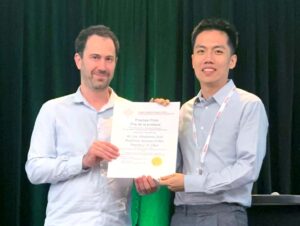

U of T researchers are the winning team of this year’s Practice Prize Competition at the Canadian Operational Research Society (CORS) Conference. The Practice Prize Competition recognizes the outstanding application of OR by practitioners in Canada, and attracts quality papers to the CORS Annual Conference.
The team, comprised of CivMin Prof. Shoshanna Saxe, Dr. Bo Lin (MIE PhD 2T5) a PDF at Rotman, Dr. Madeleine Bonsma-Fisher (PhD Physics 2022) a PDF at the Data Sciences Institute and MIE Prof. Timothy C.Y. Chan, won for their efforts towards evaluating and planning cycling infrastructure in Toronto.
According to Lin, who did this work while a PhD student at MIE, the “Analytics for Better Urban Cycling: A Multi-year Collaboration with the City of Toronto” proposed a suite of tools to assist transportation practitioners evaluate and plan bike infrastructure at the city scale—something previously impossible due to (1) the lack of a quantitative framework and (2) the computational complexity induced by a large, complex road networks. “Our method has the potential to make bike infrastructure planning more principled and data-driven, and is currently being used to support infrastructure investments involving millions of dollars.”
Lin explains, “Cycling is an effective way to promote healthy lifestyles, mitigate traffic congestion, enhance social equity, move towards sustainability, and combat climate change by reducing GHG emissions. However, safety and comfort concerns remain major barriers to cycling uptake globally. Toward the vision of making cycling safer and more inviting, we engaged in a multi-year collaboration with the City of Toronto to develop and implement a suite of analytics tools for the efficient assessment and planning of urban bike infrastructure.”

“Congratulations to Bo Lin and thank you so much to the Toronto Active Transportation team for the collaboration that made this possible,” Saxe says, quickly sharing kudos. “The dream in engineering research is to find new, effective ways to improve real-world challenges; this project has been so exciting because Dr. Lin has both developed new optimization tools – that can be useful to lots of problems – and a powerful way to get the most out of our bike networks.”
Expressing the connection from science to personal experience as a Torontonian, she continues, “Collaborating with the City of Toronto over more than five years we’ve been able to work together to apply cutting-edge science to real-world city challenges quickly, which has been incredibly rewarding as both a researcher and citizen.”
Project description:
Towards the vision of making biking safer and more inviting—thereby enhancing mobility, air quality, safety, sustainability and affordability—we engaged in a multi-year collaboration with the City of Toronto to develop and implement a suite of analytics tools for assessing and planning urban cycling networks. This partnership supported Toronto’s strategic vision to achieve net-zero emissions by 2040 (City of Toronto 2025), which has led to increased investment in cycling infrastructure.
Toronto demonstrated this commitment through its rapid response to surging cycling demand during COVID-19, building over 25 km of new bike lanes from 2019 to 2021 (City of Toronto 2021c). This momentum continued with 75 km of additional bike lanes built between 2022 and 2024, with another 100 km planned for 2025–2027 (City of Toronto 2024b). Through this partnership, we aimed to transform bike infrastructure planning into a more analytics-driven process.
Our work demonstrates both practical and theoretical contributions: on the practical side, we demonstrate how operations research tackles key transportation planning challenges with tangible real-world impact; on the theoretical side, our methodologies—spanning descriptive, predictive, and prescriptive analytics—are principled, contributing to advancements in machine learning and optimization.